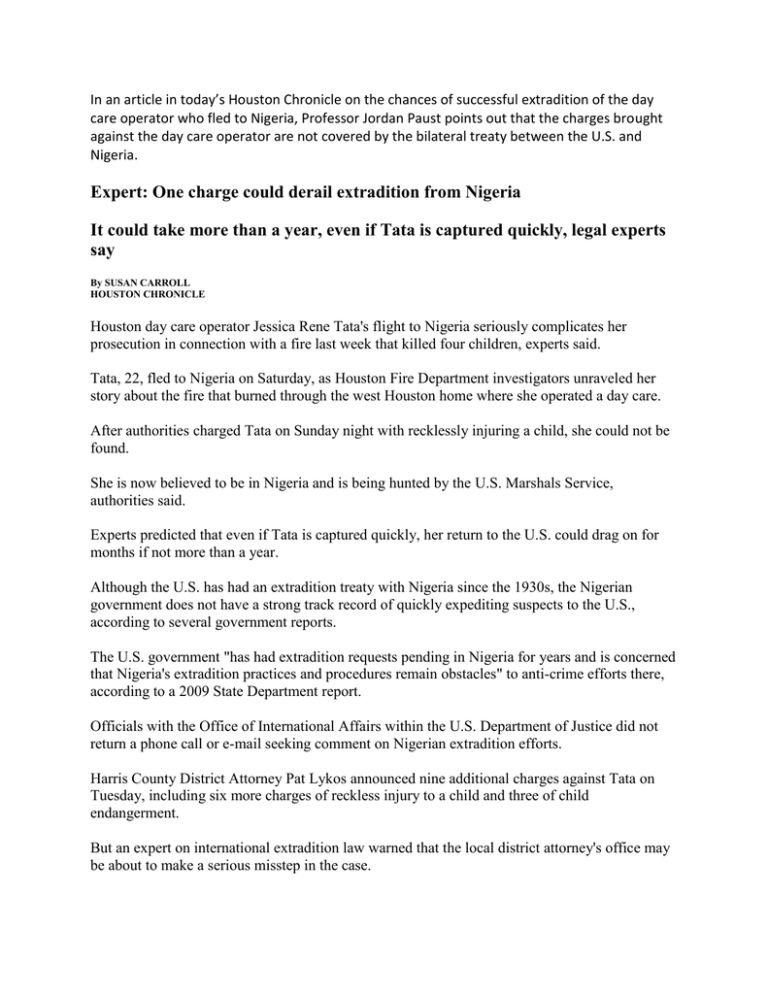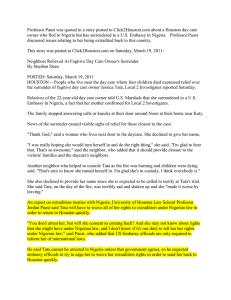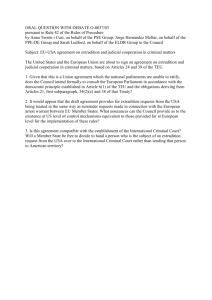In an article in today’s Houston Chronicle on the chances... care operator who fled to Nigeria, Professor Jordan Paust points...
advertisement

In an article in today’s Houston Chronicle on the chances of successful extradition of the day care operator who fled to Nigeria, Professor Jordan Paust points out that the charges brought against the day care operator are not covered by the bilateral treaty between the U.S. and Nigeria. Expert: One charge could derail extradition from Nigeria It could take more than a year, even if Tata is captured quickly, legal experts say By SUSAN CARROLL HOUSTON CHRONICLE Houston day care operator Jessica Rene Tata's flight to Nigeria seriously complicates her prosecution in connection with a fire last week that killed four children, experts said. Tata, 22, fled to Nigeria on Saturday, as Houston Fire Department investigators unraveled her story about the fire that burned through the west Houston home where she operated a day care. After authorities charged Tata on Sunday night with recklessly injuring a child, she could not be found. She is now believed to be in Nigeria and is being hunted by the U.S. Marshals Service, authorities said. Experts predicted that even if Tata is captured quickly, her return to the U.S. could drag on for months if not more than a year. Although the U.S. has had an extradition treaty with Nigeria since the 1930s, the Nigerian government does not have a strong track record of quickly expediting suspects to the U.S., according to several government reports. The U.S. government "has had extradition requests pending in Nigeria for years and is concerned that Nigeria's extradition practices and procedures remain obstacles" to anti-crime efforts there, according to a 2009 State Department report. Officials with the Office of International Affairs within the U.S. Department of Justice did not return a phone call or e-mail seeking comment on Nigerian extradition efforts. Harris County District Attorney Pat Lykos announced nine additional charges against Tata on Tuesday, including six more charges of reckless injury to a child and three of child endangerment. But an expert on international extradition law warned that the local district attorney's office may be about to make a serious misstep in the case. University of Houston law professor Jordan Paust, who reviewed the bilateral treaty between the U.S. and Nigeria this week, said it includes a long list of offenses for which a suspect is subject to extradition, including manslaughter. But the treaty does not specifically include the offense of reckless injury to a child or child endangerment, Paust said, which he predicted could jeopardize Tata's extradition. "This would be a very serious mistake not to charge for manslaughter in view of the treaty," Paust said. "Ignorance of the law is not a defense, not even for a prosecutor." Lykos said the DA's office disagreed with Paust's interpretation of the law, saying both manslaughter and reckless injury to a child are second-degree felonies in Texas. Another potential problem for prosecutors is a portion of the treaty that states suspects can only face charges for the crimes for which they are extradited, Paust said. There is a process to amend the charges, but it can get very complicated, experts said. Douglas McNabb, a federal criminal defense attorney and expert in international extradition, said if Tata is detained in Nigeria and opts to voluntarily return to the U.S., she could be back on U.S. soil within a month or so. If she fights the extradition request, she would be entitled to a hearing in Nigeria that would require the U.S. government to show probable cause for the charges underlying her extradition, he said. The Nigerian judge could find there is insufficient evidence for her extradition, or — if she faces multiple charges - extradite her only on those with probable cause, McNabb said. If she loses the hearing, she may have the right to appeal, McNabb said, saying the process could take more than a year. "You frequently see or hear state, particularly inexperienced state (district attorneys) and law enforcement saying, 'Oh, we'll get her back right away. We have an extradition treaty,' " McNabb said. "Well, that may or may not be true." Staff reporter Peggy O'Hare contributed to this report.




